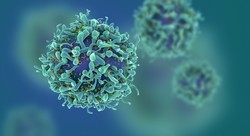Novel immune cells with anti-cancer properties
Recently, a new subpopulation of CD4+ T lymphocytes have emerged with pro-inflammatory properties. These Th9 cells secrete IL-9 and were originally shown to promote inflammation in colitis and asthma as well as in animal models of multiple sclerosis and experimental autoimmune encephalomyelitis (EAE). Co-transfer of in vitro differentiated Th9 cells along with effector cells was shown to increase the severity of colitis in mice. However, recent evidence suggests that these cells also have potent anti-cancer properties. Despite the importance of these cells, there is limited knowledge on how they are generated or how they interact with other effector cells to deliver their anti-cancer activity. The EU-funded T9CAN (Transcriptional regulation of IL-9-producing CD4 T cells: use in cancer immunotherapy) project set out to address these issues and lift any restrictions on the putative use of Th9 cells in cancer immunotherapy. T9CAN research activities indicated that Th9 cells presented with enhanced anti-cancer properties when induced in the presence of the pro-inflammatory factor interleukin-1beta (IL-1beta). IL-1beta not only triggered Th9 generation but selectively enhanced the expression of the transcription factor IRF1 in developing Th9 cells. IRF1 was found to be responsible for Th9 effector functions and anticancer properties through a MyD88-Stat1 axis. In addition, researchers observed that the anti-cancer efficacy of Th9 cells in vivo strongly depended on IL-21 and the activation of immune effector NK and CD8 T cells. Collectively, the T9CAN study helped decipher the molecular mechanisms responsible for the effect of IL-1 beta on Th9 cells and the factors responsible for the anti-cancer properties of these cells. The outcome of the study supports the modulation of Th9 biological activity as a strategy with potential application in cancer immunotherapy.







